Belo Horizonte offers visitors a taste of Brazil’s authentic cuisine and culture beyond the big tourist destinations like Rio and São Paulo. It is Brazil’s 6th largest city with a population of nearly 3 million people. Belo Horizonte was built amongst mountains and on hilly terrain providing the reason for its namesake – beautiful horizon.
Visitors won’t find a beach here. Instead of a bathing suit, bring an appetite and maybe some stretchy pants and your walking shoes.
In Belo Horizonte, also known simply as Belo or BH for short (pronounced “bae-agah”), you will find modern high rises, preserved colonial-era buildings, an old and new central market, museums, and tree-filled parks.
It’s the perfect mid-size city in Brazil to spend a couple of days exploring and savoring the famous Comida Mineira or food from Minas Gerais. Continue reading for your guide to exploring Belo Horizonte, Brazil.
Capital of Minas Gerais
Belo Horizonte is the state capital of Minas Gerais. The state of Minas Gerais played an important role in Brazil’s early history. It provided much of the initial wealth for the Portuguese crown during the 18th and 19th centuries.
This is in large part due to the mineral-rich cities like Ouro Preto and Diamantina where African slaves, indigenous peoples, and European immigrants mined for gold and diamonds.
Minas Gerais is also where one the country’s first highway, Estrada Real, was constructed in 1697. It was created to support the trade of the minerals mined in Minas Gerais. Estrada Real connected the mineral rich cities to port cities in Rio de Janeiro.
Because of its importance in the gold mining industry, Ouro Preto was the first capital of Minas Gerais but it later moved to the planned city of Belo Horizonte.
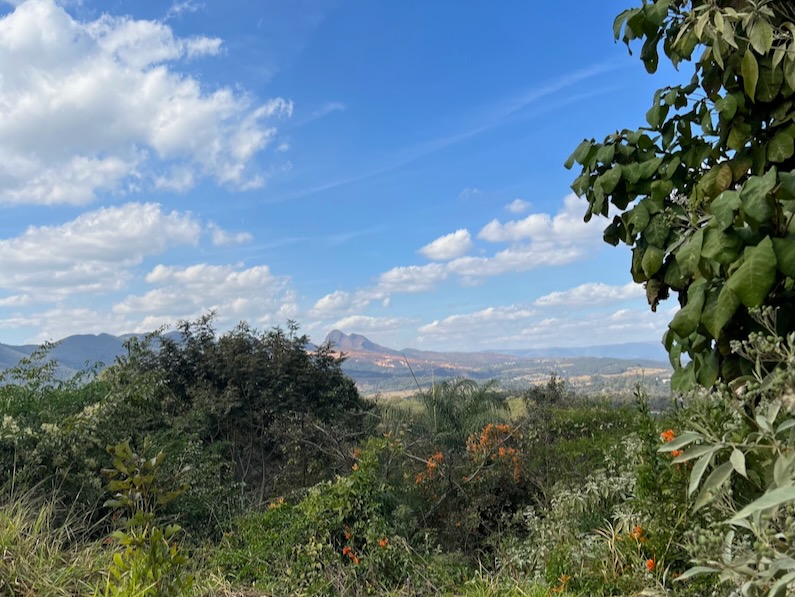
Belo Horizonte is a Foodie Town
“Já que em Minas não tem mar, vamos para o bar.”
Lyrics from Brazilian singer-songwriter, Alexander Peixe, translates to “Since there is no sea in Minas, let’s go to the bar.”
Belo Horizonte backs Minas Gerais’ claim as the capital of botecos or bars in Brazil. These botecos aren’t just serving ice-cold beers and caipirinhas. Many are famous for their pub grub.
The Comida di Buteco festival, Brazil’s largest gastronomic contest, honors the cuisine from the botecos in Belo Horizonte and Minas Gerais.
What was once a city celebration in Belo Horizonte, today over 1,000 botecos nationwide participate in the contest held annually in April and May. If you’re a foodie, planning your visit to Belo Horizonte during the festival is highly recommended.
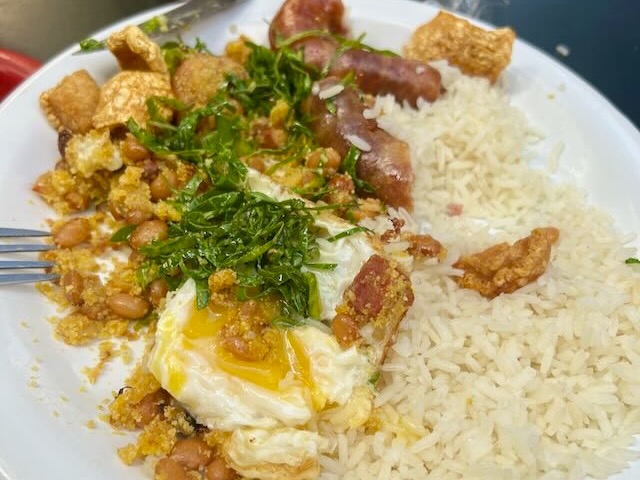
Where is Belo Horizonte
Belo Horizonte is the capital of Brazil’s second-largest state, Minas Gerais. Minas Gerais is in southeast Brazil and shares borders with several states including São Paulo, Rio de Janeiro, Goiás, the Federal District, Bahia, and Espírito do Santo.
Rio de Janeiro is just over 6 hours or 275 miles southeast of Belo Horizonte by car.
Traveling to Belo Horizonte
During our visit in July 2022, we spent 2 days and 2 nights in Belo Horizonte. We then rented a car and drove to Ouro Preto for another 2 days, 2 nights.
On our 5th day, before returning to Florianópolis, we squeezed in a morning hike to Pico do Itacolomi in the Parque Estadual do Itacolomi outside Ouro Preto and an afternoon at the Mercado Novo back in Belo Horizonte.
Coming from Florianopolis, we flew into Tancredo Neves International Airport (CNF), located 45 minutes north of the city center.
If you’re already spending time in Rio de Janeiro, Belo Horizonte can be paired with a road trip from Rio via the scenic tourist route, Estrada Real.
Where to stay in Belo Horizonte
There are a ton of affordable hotels in Belo Horizonte. For our hotel search, I focused on the following criteria for this trip:
- Location: I wanted a centrally located hotel within walking distance to places I knew we would be visiting. I was able to narrow it down to the Savassi and Lourdes neighborhoods.
- Affordability: I knew we wouldn’t be spending a lot of time at the hotel so we chose a reasonable price over Instagramable rooms and rooftops.
- Good Reviews: Even though we weren’t looking to stay at the Fasano, I still wanted the hotel to be pleasant.
In the end, we stayed at the Royal Boutique Savassi Hotel. The hotel has the vibe that 15 years ago it was probably a top-notch hotel catering to businessmen. Today it lacks charm and picture worthy views but was sufficient for our stay.
Other hotels worth checking out:
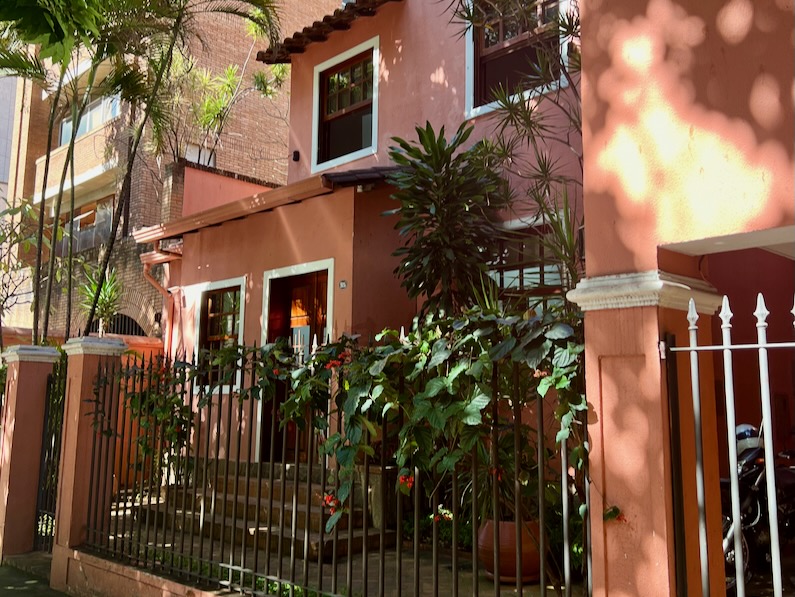
Day 1 Itinerary in Belo Horizonte
Day 1 Overview
- Breakfast at Padero Padaria e Cafeteria
- Uber to Parque Municipal das Mangabeiras and Mata Mirante for the best city views
- Cruise the Savassi neighbor walking streets and lunch at Bar do João
- Visit the Praça da Liberdade
- Roam the Mercado Central, sampling cachaça, doce de leite, and queijo mineiro
- Dinner at one of the best restaurants in Minas Gerais: Restuarante Glouton
Parque Municipal das Mangabeiras:
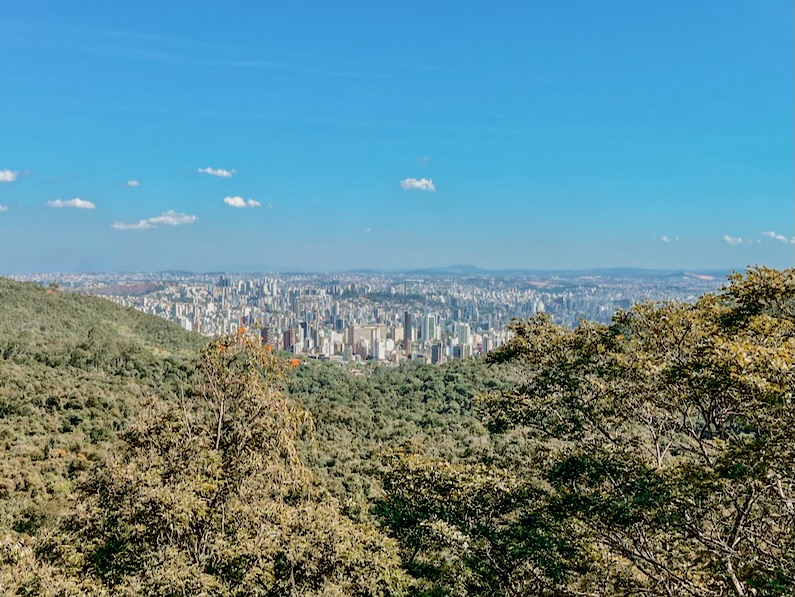
From the padaria, we grabbed an Uber to Parque Municipal das Mangabeiras. You’ll want to have your walking shoes on for this stroll through the park as it is located on a hill.
Our Uber dropped us off at the entrance to the park. No private cars are permitted past this point. There was a gate with an attendant but no entrance fee.
In Parque Municipal das Mangabeiras, we saw locals taking advantage of the hills and fresh outdoor spaces to work out. There is a playground and skatepark located inside the park boundaries. Overall, the park seemed a little rundown, and many trails were sadly closed.
We strolled around aimlessly for a bit, just happy to stretch our legs after the early morning flight before finally making our way up the paved road to the Mata Mirante.
If you prefer to not walk, there is a shuttle that runs from the park entrance to the viewpoint. It’s about a 20-minute walk uphill to the observation deck.
The view of Belo Horizonte city skyline and surrounding mountains was worth the climb and a fun way to start our weekend in the city.
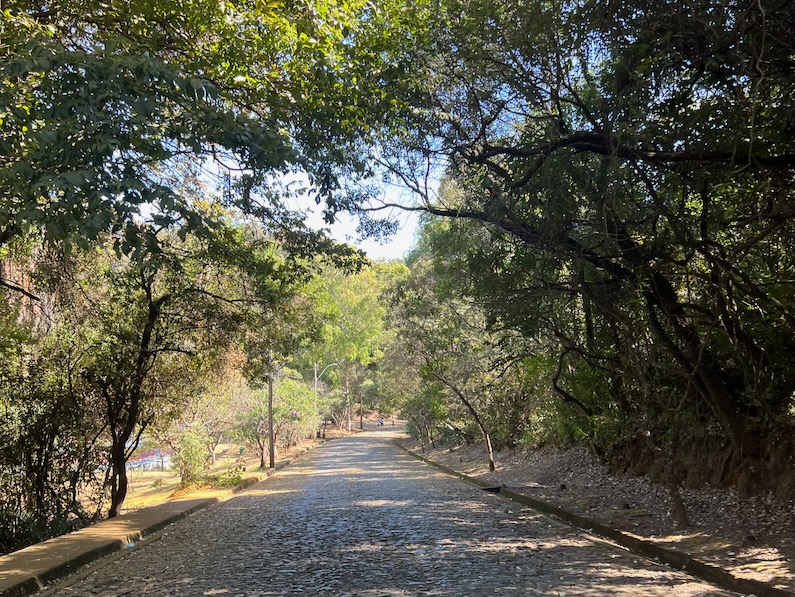
Praça do Papa Viewpoint
If you don’t want to go all the way to Parque Municipal das Mangabeiras, you can visit Praça Governador Israel Pinheiro instead. This square is locally referred to as Praça do Papa after the Pope’s visit in 1980.
While the view isn’t as impressive as the one from Mata Mirante, it’s a great spot to grab coconut water from a street vendor and gaze down at the city. You can walk downhill from Parque Municipal das Mangabeiras to Praca do Pope (less than 1 mile).
The neighborhood in between the park and square almost feels like it could be in Los Angeles, with its rolling brownish-green hills and large modern homes.
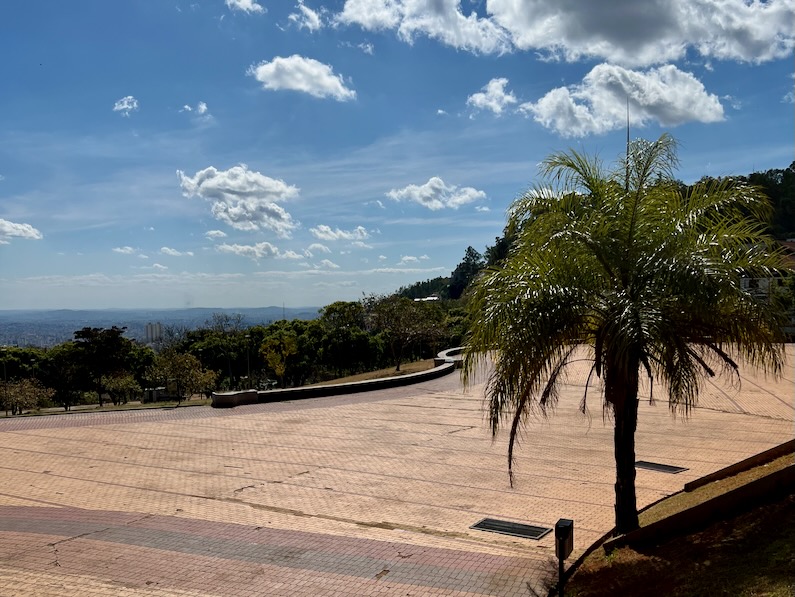
Mineiro Lunch in Savassi Neighborhood
Having walked over 4 miles before noon, we Uber’d from the Praça do Pope to the Savassi neighborhood in search of a classic Minerio lunch.
Savassi is a lively area that feels more local than touristy. It has a couple of walking streets lined with businesses, shops, and places to eat and drink.
The lunch hour in Savassi was filled with young professionals and residents going about their midday break.
Bar do João
We didn’t have a specific restaurant in mind but noticed a chalkboard menu sign outside of a small spot called Bar do João.
The lunch of the day or almoço do dia just happened to be feijão tropeiro com linguiça – a classic dish from this region that can include ingredients like beans, rice, dried meat, fried eggs, collard greens, pork rinds, and cassava flour.
The meal dates back to the turn of the 18th century when tropeiros, or groups of men who traveled moving goods, cattle, and news from city to city in Brazil, needed an easy meal that was also nonperishable.
While considered very Brazilian today, the dish relies on influences from African, Indigenous, and Portuguese cuisine.
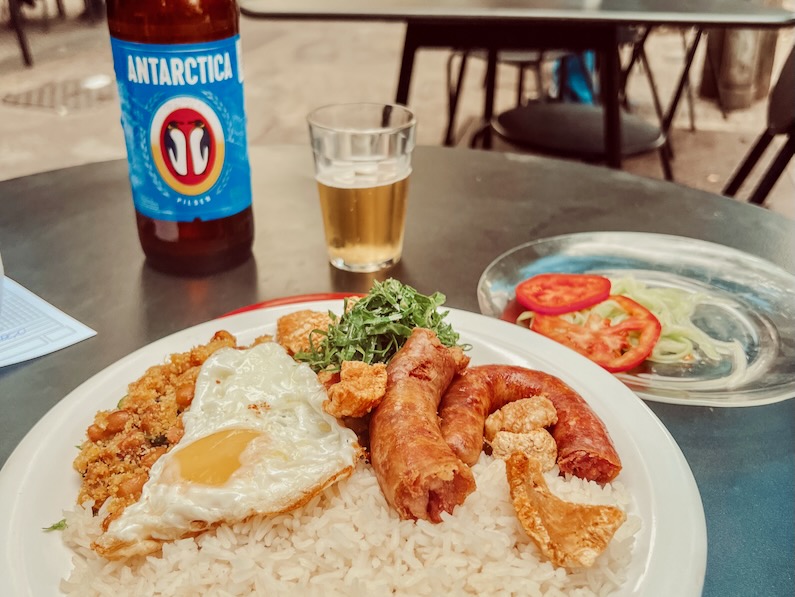
Praça da Liberdade
Following lunch we walked to the Praca da Liberdade, about 15 minutes from Bar do João. We were familiar with the praça from watching hours of Bom Dia Brasil (like the Today Show in Brazil) while learning Portuguese.
It’s a regal praça, surrounded by ornate historical buildings, symmetrically planted palm trees, and large water fountains.
Initially the headquarters of the Minas Gerais state government, today the Praça da Liberdade is a cultural center consisting mostly of museums.
Here visitors will find:
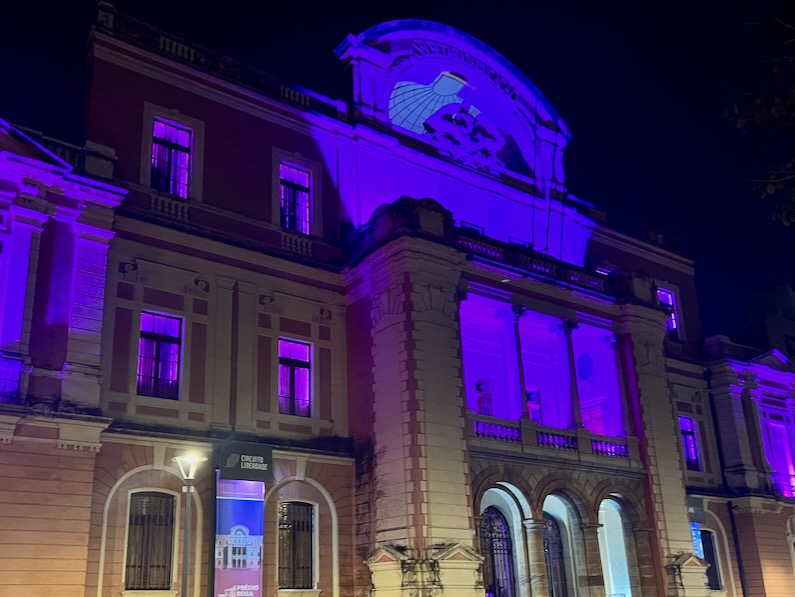
Mercado Central
Entering the maze-like, 150,000 square feet market (about 3 football fields or your average Target store) your senses are immediately hit with different aromas and colors. My first impression was how clean the market appeared. After visiting similar markets in Chile and Brazil, I’m even more impressed with Mercado Central’s tidiness.
Mercado Central History
When the Mercado Central first opened in 1929, it consisted of 22 wooden stalls and wagons in an uncovered plot of land owned by the city. In 1964, the city attempted to close the market claiming it could no longer manage it. However, the merchants saved the market by pooling their funds together and buying the land from the city.
The sale of the land had one stipulation, the market needed to be converted to an indoor space and if the merchants were unsuccessful within five years they would have to return the land. With the help of private investors, the merchants accomplished their goal of constructing Belo Horizonte’s premiere indoor market.
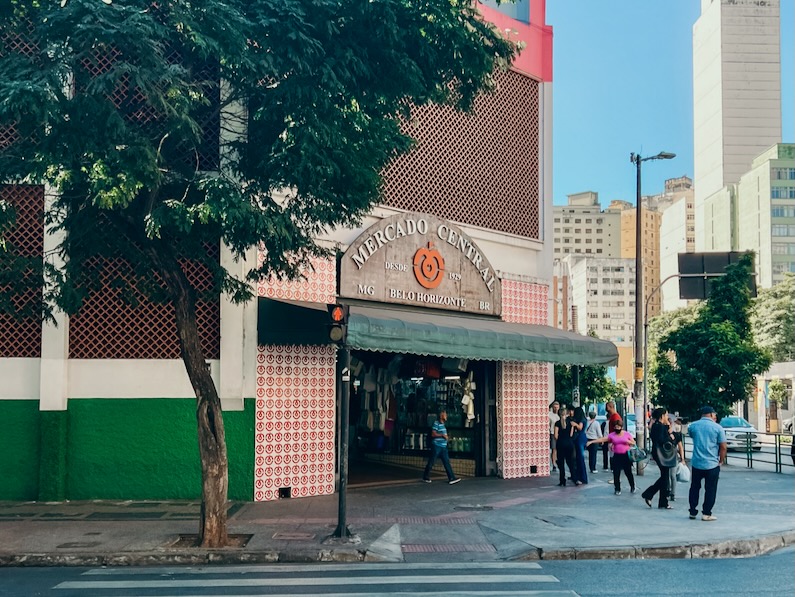
Mercado Central Today
Today Mercado Central features 400 storefronts and sells more than just the essential produce and meat. It attracts as many tourists as locals, and you can easily spend a couple of hours wandering the rows of stalls. We found it very easy to get lost and, at more than one time, felt like the depth of the market was never-ending.
Inside the market, you’ll find exotic produce, mounds of spices, beef, fish, pounds of cheese from Minas Gerais, jars of dulce de elite, and blocks of goiabada or guava. Some of the storefronts will let you sample their goods before buying.
There are also several culinary supply and artisan craft stores selling classic Minas Gerais kitchen items like cast iron pans, stone marble bowls and plates, giant metal pots, colorful coffee mugs, and other trinkets.
There are many restaurant stalls within the market. If you’re looking for a particular one, I suggest looking on the Mercado Central online directory.
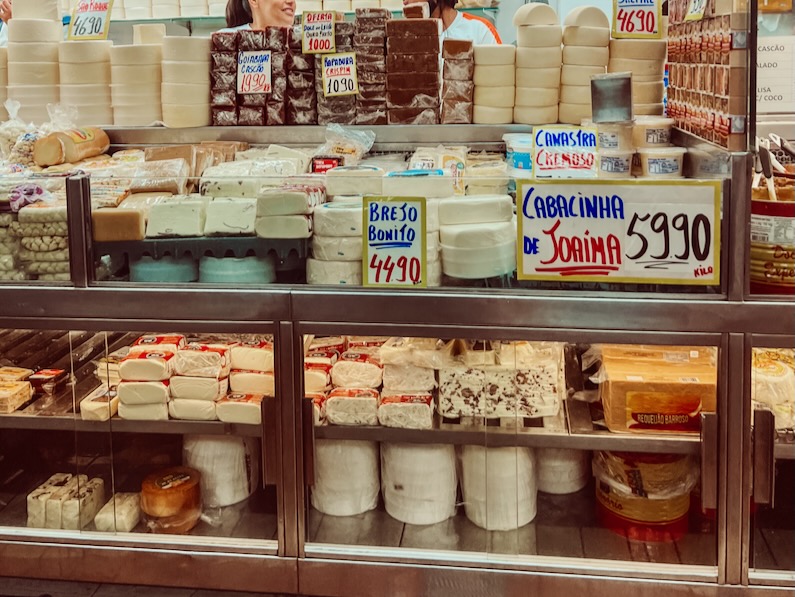
Lunch in the Market
Despite having already eaten lunch, we knew the market was a great opportunity to try the classic Belo Horizonte dish – fígado com jiló or beef liver with bitter eggplant and caramelized onions at Bar do Jùlio.
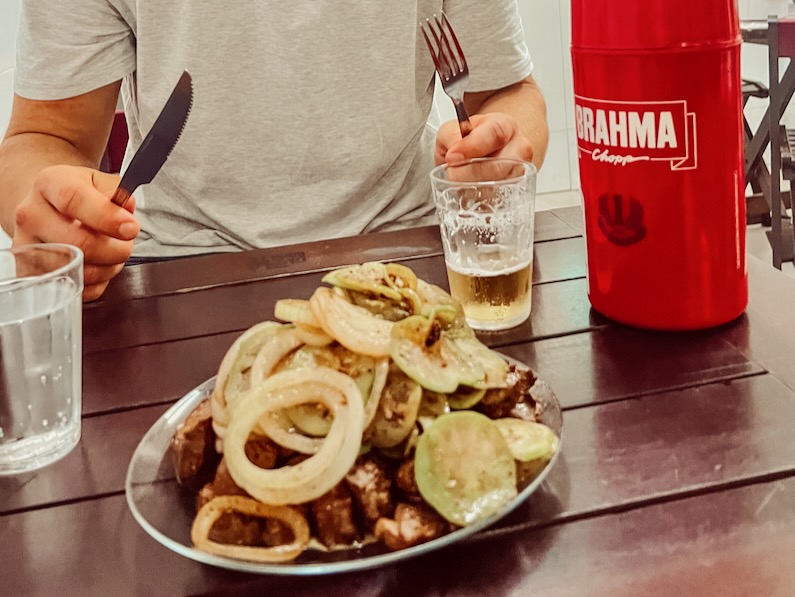
There is nothing fancy when it comes to Fígado com jiló, but it is a staple at the stalls. There’s something great about the healthy aspect of the liver being balanced out by the amount of oil the dish is cooked in.
If you’re not a fan of beef liver or if the eggplant is too bitter, you’ll probably need a cold beer to wash it all down.
Cachaça from Minas Gerais
Minas Gerais is the leading producer of artisanal cachaça in Brazil. Most tourists only have the chance (for better or worse) to taste cheap cachaças with their caipirinhas. However, if you like sampling complex and aroma-filled spirits like bourbons and scotches, head to Ponto das Bedidas in the Mercado Central.
When we visited, they kindly let us try a variety of aged cachaças and even helped us select a special gift to bring home. Our favorite find from this bottle shop was the Cachaça Mineiriana Carvalho.
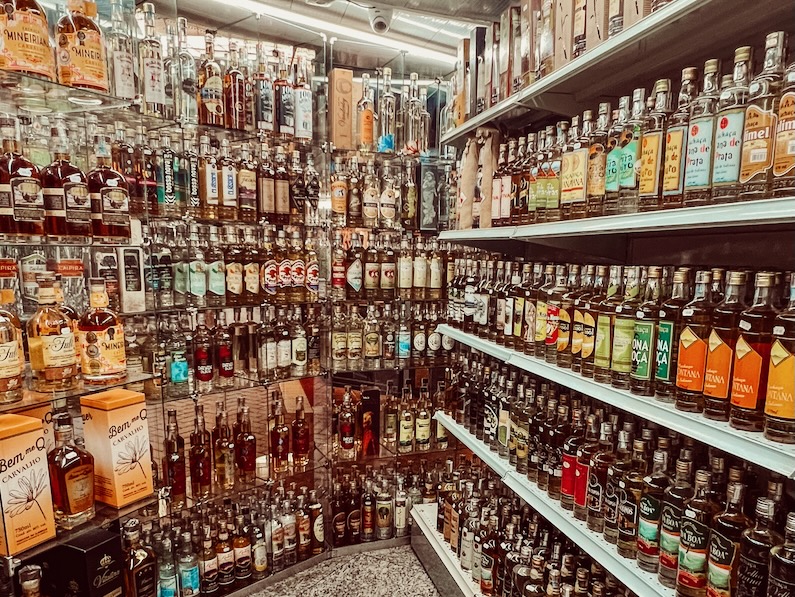
Dinner at Restaurante Glouton
Continuing our food journey in Belo Horizonte, we made dinner reservations at the award winning Restaurante Glouton.
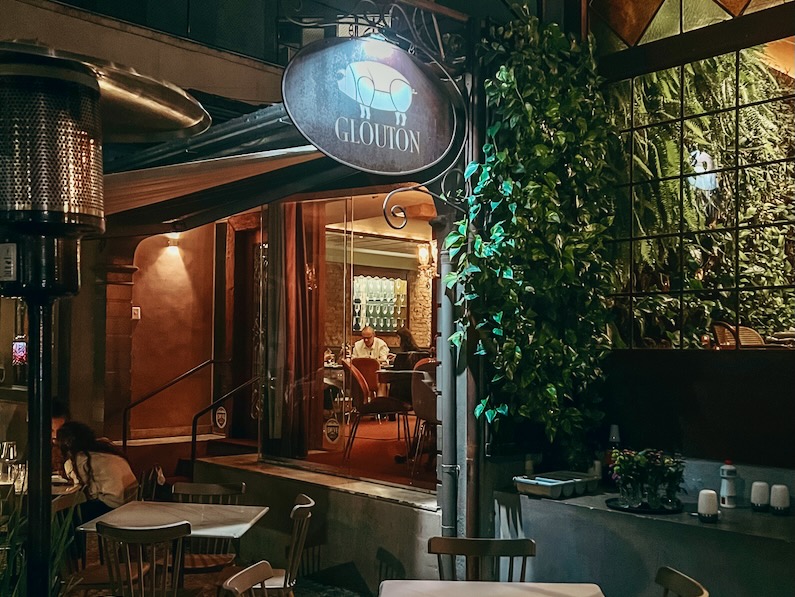
The chef, Leo Paixo, was featured on Anthony Bourdain’s Parts Unknown Minas Gerais episode – which was mostly filmed in Belo Horizonte. Paixo relies on Mineiro or Brazilian ingredients to create plates that look like pieces of art and taste amazing.
Eating at Restaurante Glouton is a full culinary experience. The restaurant offers a fixed 8-course dinner with the option to harmonize the courses with a pre-selected beverage – this is usually a craft cocktail or wine depending on the course. Our waitress, who spoke excellent English, provided us with the meaning and purpose behind every course adding to the experience.
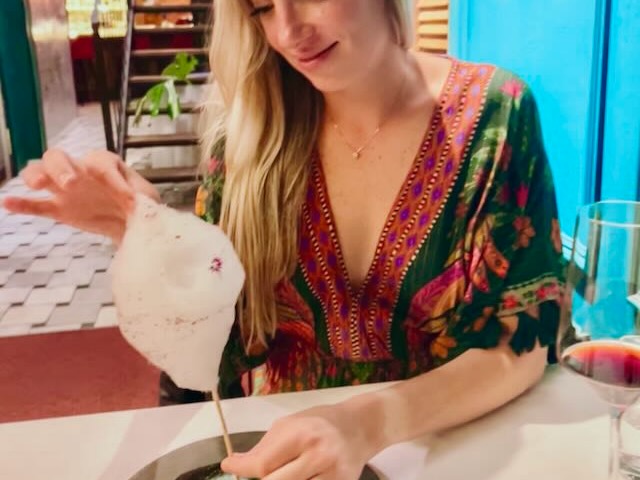
Day 2 in Belo Horizonte
Day 2 Overview
- Breakfast at Royal Boutique Savassi Hotel
- Full day at Inhotim Museum
- Beers and apps at Capa Preta Tap House
- Dinner at Ponto Savassi
Inhotim Museum
Day 2 started early. Still full from our dinner at Restaurante Glouton the night before, we picked at the hotel breakfast knowing we had a 1.5 hour bus ride ahead of us to the Inhotim Museum.
When you visit Inhotim Museum, expect to be blown away by not just the contemporary modern art but also the impressive botanical gardens. It is one of the largest open air museums in the world stretching 140 hectares. The museum displays over 700 pieces of art both inside galleries and outside in the botanical gardens. Within the gardens are 4,300 rare species of flora and fauna from around the world.
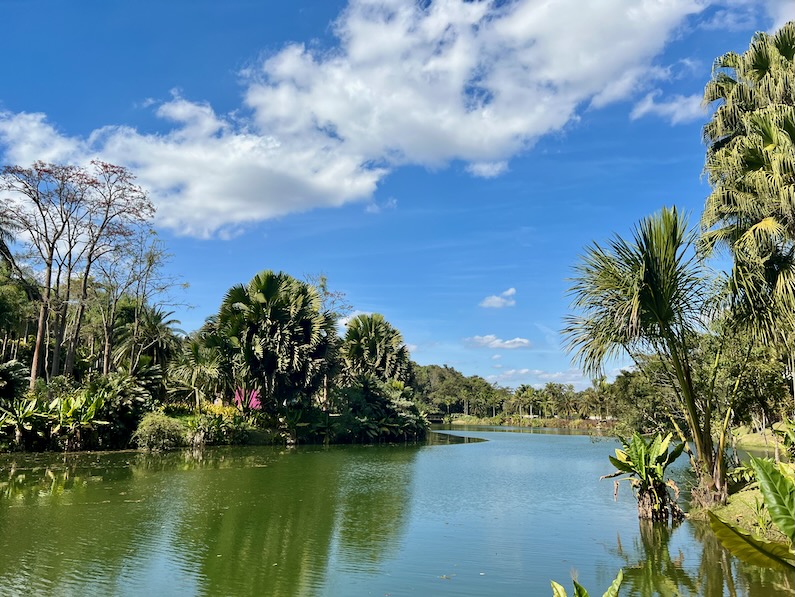
Is it worth a visit if you don’t know anything about modern art?
Inhotim is like the Disneyland of modern art. We are extreme novices when it comes to art and still loved spending our day at the museum even if we weren’t able to fully grasp the meaning behind every piece. Inhotim is so unique compared to other modern art museums and some of the exhibits are literally larger than life.
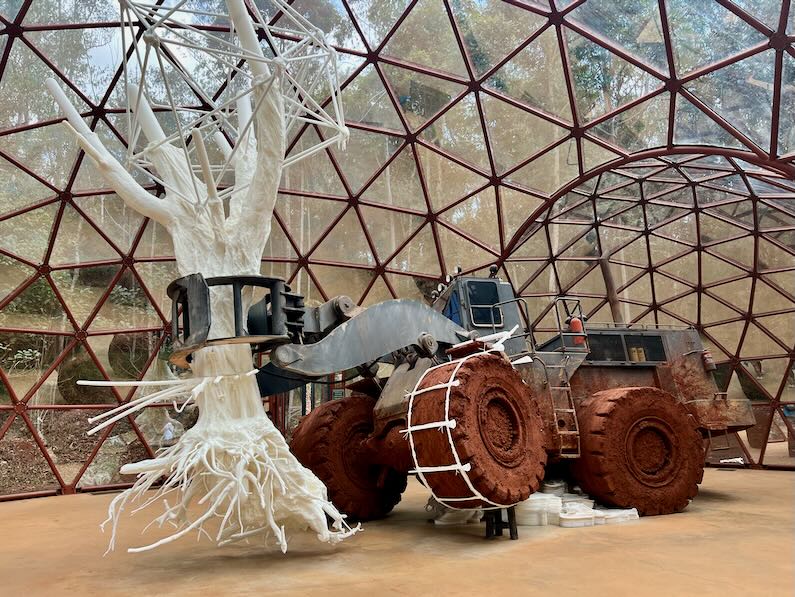
How much time do you need
At the very least you need a full day. We arrived right when Inhotim opened at 9:30 am and stayed until closing at 4:30 pm. Despite having all day to explore we didn’t get a chance to see everything and felt rushed at certain exhibits. If you’re a modern art lover, definitely purchase the multi-day Passport Pass.
Lunch at Inhotim
There are 9 restaurants or “fast-food” options throughout the park. While many full-service restaurants looked excellent, we chose a quick lunch of açaí and empanadas at Casa de Sucos to maximize our time.
We also enjoyed a coffee upon arrival and a beer just before leaving at Cafe das Flores, located next to the museum store.
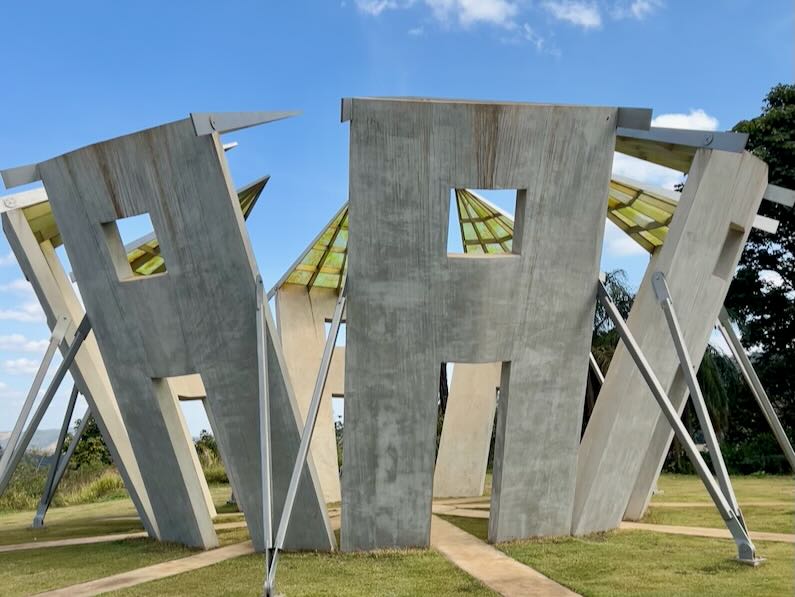
Golf cart rental:
Expect to walk A TON! We clocked over 25,000 steps the day we visited Inhotim and it felt like we barely scratched the surface. Wear sneakers or a shoe you are comfortable walking several miles in.
We didn’t reserve golf cart transportation, mostly because we had no idea how extensive the property would be. The golf carts operate like buses throughout the museum. Sometimes they can take you right up to an exhibit entrance and other times you still have to walk quite a bit after being dropped off.
While we were exhausted, I’m glad we walked. At times we were the only ones in sight strolling through the beautiful, lush grounds in between exhibits. If you have kids or tire easily, the golf cart is a good option to maximize the visit and make it more enjoyable.
A shared golf cart (operates like a bus with stops) is R$35pp. You can also reserve a private golf cart for R$750 for 5 people or R$1,050 for 7 people.
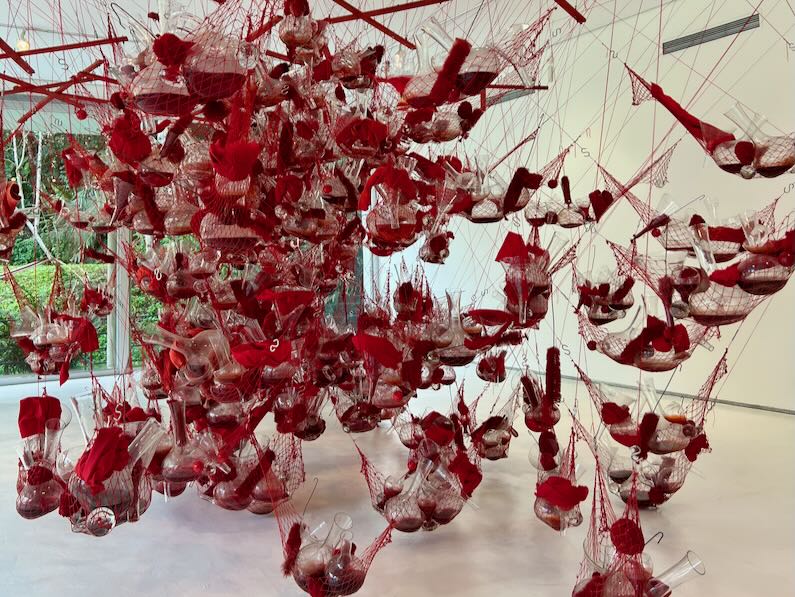
Inhotim Ticket Information:
Adult: R$50 (Entrada Inteira)
Students, kids 6-12yr, teachers and seniors over 60yr: R$25 (Entrada Meia)
Museum entry is free for all on the first Wednesday of the month.
The museum capacity is 5000 people so buying in advance is recommended. Tickets for the museum can be purchased upon arrival or through the following two sites:
How to get there
Inhotim Museum is located 45 miles southwest of Belo Horizonte. If you don’t have a rental car or prefer to not drive there are two organized transportation options:
- The Be Ticket bus leaves from the Holiday Inn in Savassi at 7:45 am and costs R$110pp
- The Saritur Bus Lines leaves from the Rodoviária de Belo Horizonte and costs R$98pp
On the Be Ticket website you can also purchase your museum entry tickets and choose to reserve golf cart transportation throughout the museum property.
We used the Be Ticket bus, and it was a great experience! We visited the museum on a Friday and our return trip was significantly slower (2.5 hours) due to weekend traffic. I do think these buses sell out (ours was full), so buy in advance!
More information
Inhotim has a very helpful English website to prepare for your visit.
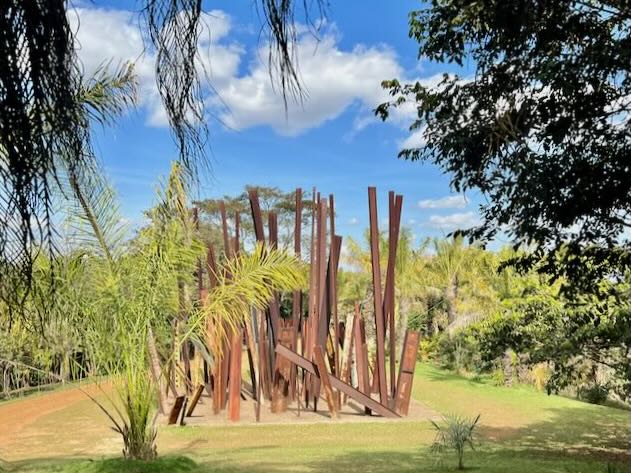
Night out in Savassi
After our full day of walking at Inhotim we returned to Belo Horizonte to enjoy one last evening in the Savassi neighborhood.
Whenever we visit a new city, finding a local craft brewery is always a top priority. We started our evening at the award-winning Capa Preta Tap House. The Belo Horizonte brewery has a self-service tap wall where you can pour your beers. They also offer a full food menu.
Ponto Savassi
For dinner, and a change of scenery, we walked over to Ponto Savassi. We had walked by Ponto Savassi during the day and it had a bumping lunch crowd. The environment wasn’t much different in the evening. Ponto Savassi is a classic, super casual sidewalk pub in Belo Horizonte. There were probably 50 tables outside, packed with people of all ages enjoying the warm Friday night.
It was a lively scene. A woman wearing a restaurant shirt was working the crowd like a local celebrity. She was going table to table with a card game. The winner would get a trendy snapback hat with the restaurant’s name on it.
The game produced a lot of hooting and hollering as winners and losers were declared. It wasn’t our lucky night but it was fun to be a part of the scene. The people-watching was also next level.
Ponto Savassi Food
During the day, Ponto Savassi offers a popular lunch buffet. For dinner, they have a long list of espetinhos or skewers of brazilian beef cuts, chicken, chicken hearts, liver, cheese, sausage, kafta, and fish. You can also order plates of churrasco or BBQ cuts of meat like picanha and alcatra, delicious loaves of warm garlic bread, and other classic Minas Gerais dishes like mexidão.
Ponto Savassi has an extensive beer and liquor list to go along with its pub grub.
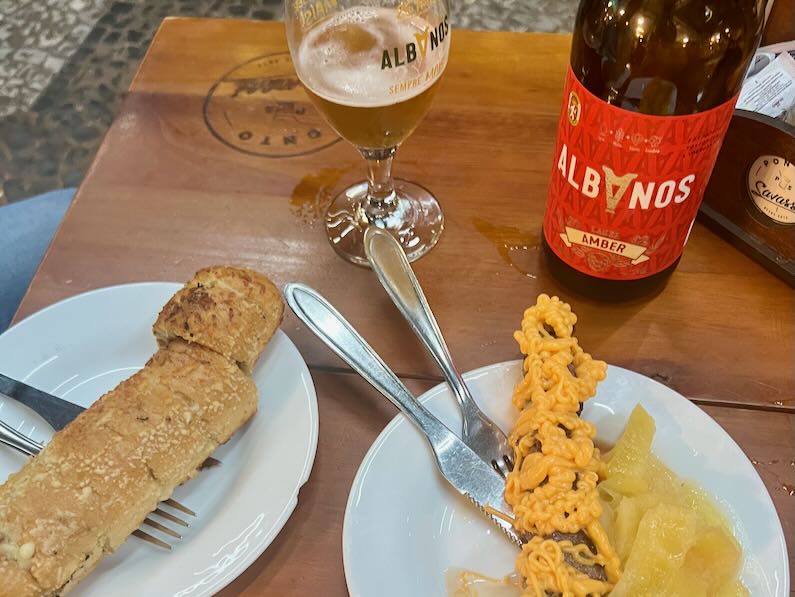
Day 3 in Belo Horizonte
On day 3, we had breakfast at the time-honored Café Nice before driving to Ouro Preto. We then spent a few days in Ouro Preto and Mariana before coming back to Belo Horizonte to enjoy the can’t-miss Mercado Novo before our flight.
Alternative Day 3 Full Itinerary
If we hadn’t gone to Ouro Preto our perfect 3rd day in Belo Horizonte would’ve included:
- Breakfast at Café Nice
- Visit the Church of Saint Francis of Assisi and the greater Pampulha cultural area
- Lunch and shopping at Mercado Novo
- Stroll the Américo Renné Gianetti City Park
- Dinner and drinks at Birosca S2 in the bohemian neighborhood of Santa Tereza
Café Nice
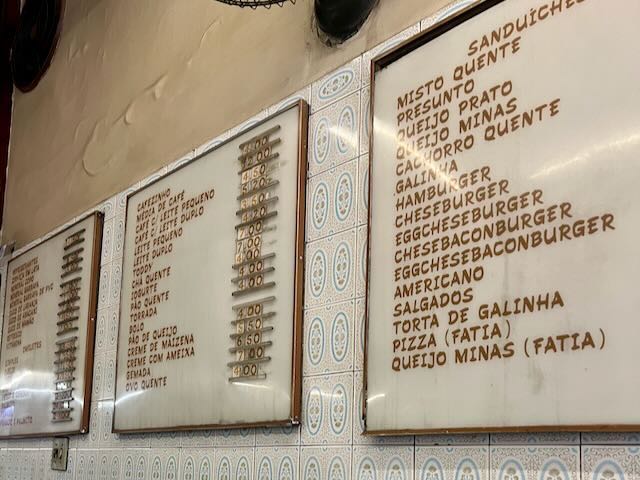
Visiting Café Nice is like going back in time. This local fixture first opened in 1939 and not much has changed since then.
It has long been a popular stop for politicians dating back to the 1940s, similar to the visits politicians make to small town diners in the US. Photos of these meetings and other famous guests are displayed proudly on the iconic tiled walls.
The most popular order at Cafe Nice
A coffee with pão de queijo or Brazil’s famous cheesy bread. During its long history, Café Nice has sold as many as 3,000 coffees a day. There is no website or Instagram for Café Nice, only online reviews and articles written mostly in Portuguese are available to help guide your order.
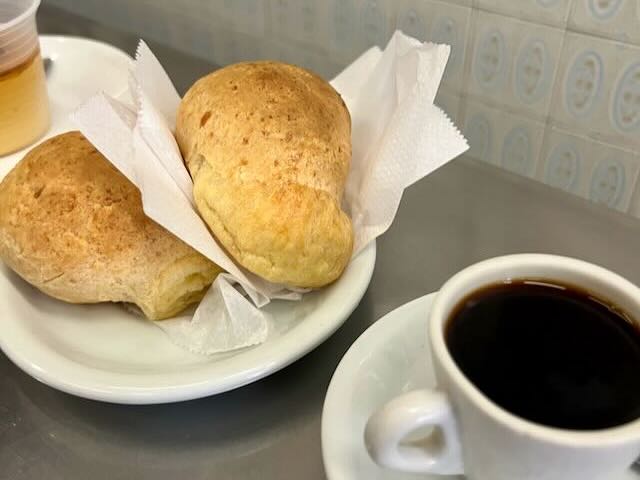
We didn’t know what exactly to expect the morning of our visit to Café Nice. Luckily for us, the place was mostly empty, we didn’t feel rushed and were able to take some nice photos.
I had done some deep digging online to craft what I considered a well-rounded order:
- 2 cafezinhos – small but strong coffees
- 2 pão de queijos – cheese bread
- 1 creme com ameixa – a creamy pudding sitting on a bed of plum syrup
- 1 frapê de coco – basically a thin coconut milkshake but so much better
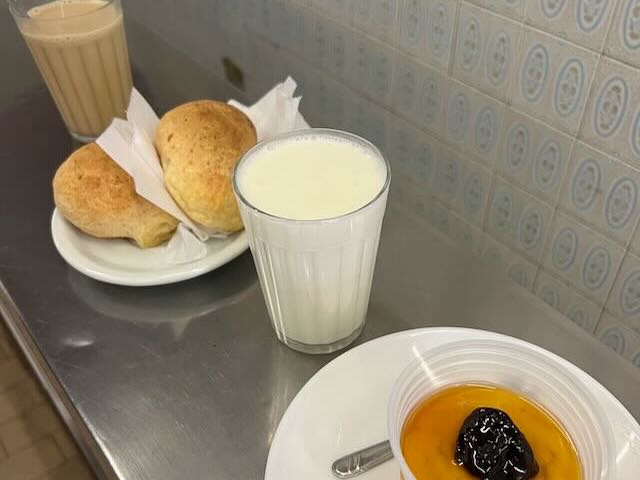
The (Velho) Mercado Novo
The Mercado Novo is a millennium kid’s dream but you would never know this from looking at the outside of the building. This unassuming building is just around the corner from Mercado Central. You could easily spend a morning at the old market and the rest of the afternoon at the new market.
While it is called the new market, this market has been around since the 1960’s when it serviced mostly restaurants from its first floor. In 2018, the second floor of the market received its first-ever tenants – a restaurant and brewery. Today the second and third floors contain over 90 businesses.
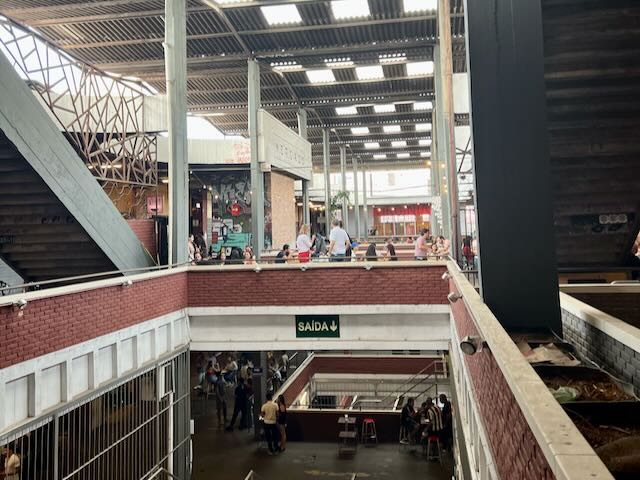
Products from Minas Gerais
What makes Mercado Novo so unique? You won’t find the trendiest food, home accessories, or clothes out of New York City or São Paulo. Here, every product is connected to the traditions and culture of Belo Horizonte, while also super Instagrammable.
Craft breweries, cachaça and gin bars, clothing boutiques, music stores, handmade home decor shops, and tons of delicious restaurants, there is something for everyone at the Mercado Novo.
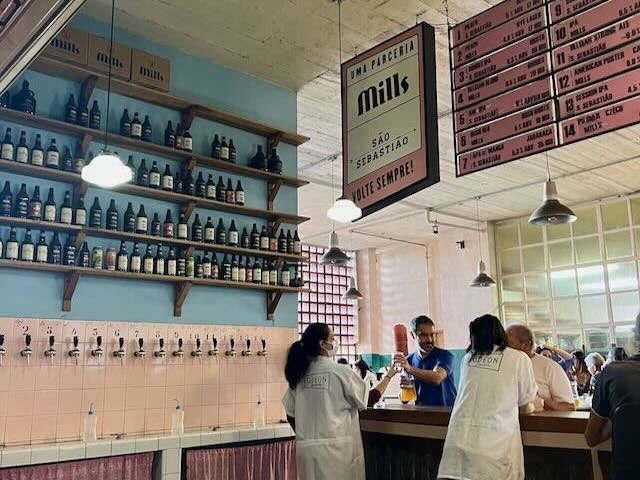
We were able to squeeze in a (too) quick visit on a Sunday afternoon. The market was surprisingly busy despite many of the boutiques and non-food shops being closed.
While crunched for time, we were able to visit and enjoy the following places:
- Fubá no Mercado – This restaurant features corn as the base of many of its plates
- Café Jeticoba – Artisan coffee drinks
- Odeon Bebidas a Granel – Craft beer and drink
- Cervejaria Viela – Brewery and one of the first businesses to open on the 2nd floor
- Minhaavó – Cake shop
- Made in Beagá – Minas Gerais souvenir shop
- Atelier Glaucio Cerâmista – Artisan ceramic shop
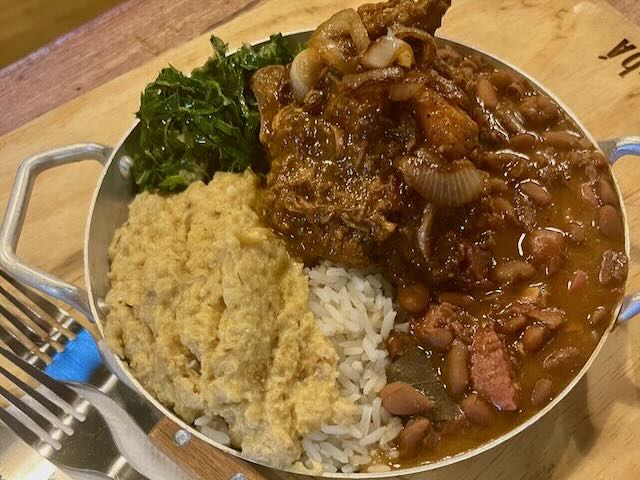
It is a little overwhelming when you first enter the space. Having the time to just wander and check out all the hidden gems within the market is ideal. To help plan your visit, especially if you are limited with time, check out the Mercado Novo Instagram, where they list almost all of their storefronts and services along with the Instagram handles.
Parking at Mercado Novo
If you plan on driving to Mercado Novo, the parking situation is a little hairy and the surrounding area didn’t give off the safest vibes for street parking, especially with our luggage in the car.
We arrived around 2 pm on a Sunday and waited about 30 minutes just to be able to park. At the time of our visit in July 2022, the parking area inside the Mercado Novo relied on the same entry and exit passageway. This means they have to control when cars enter to allow for cars to exit.
If we hadn’t been going to the airport and returning our rental car after the Mercado Novo we would’ve just Uber’d to avoid the chaos.
We loved Mercado Novo so much, that we are considering another weekend trip to Belo Horizonte just to be able to visit again.
Where to Eat in Belo Horizonte
- Mercearia 130 Lourdes: Full service restaurant serving Brazilian classics
- Casa Bonomi: Bakery serving treats, sandwiches, and coffee
- D’Artagnan: Upscale restaurant that draws on French, Italian and Mineira influences
- Uluru Café: Australian cuisine inspired cafe
- Casa dos Contos: Classic Belo Horizonte dishes
- A Pão de Queijaria: Restaurant chain specializing in Brazil’s cheesy bread
- Cantina do Lucas: Classic Brazilian/Minas food
What to watch before you visit
Anthony Bourdain’s Parts Unknown: Minas Gerais released in 2016, Anthony Bourdain visits Belo Horizonte, Mercado Central, Inhotim Museum, and Ouro Preto.










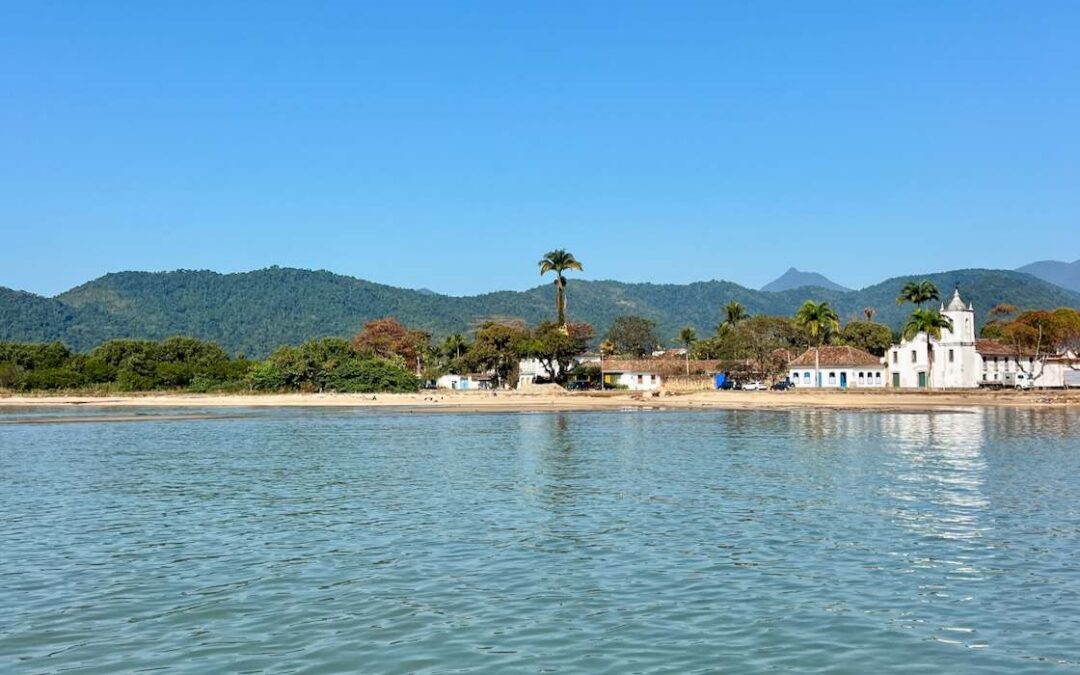
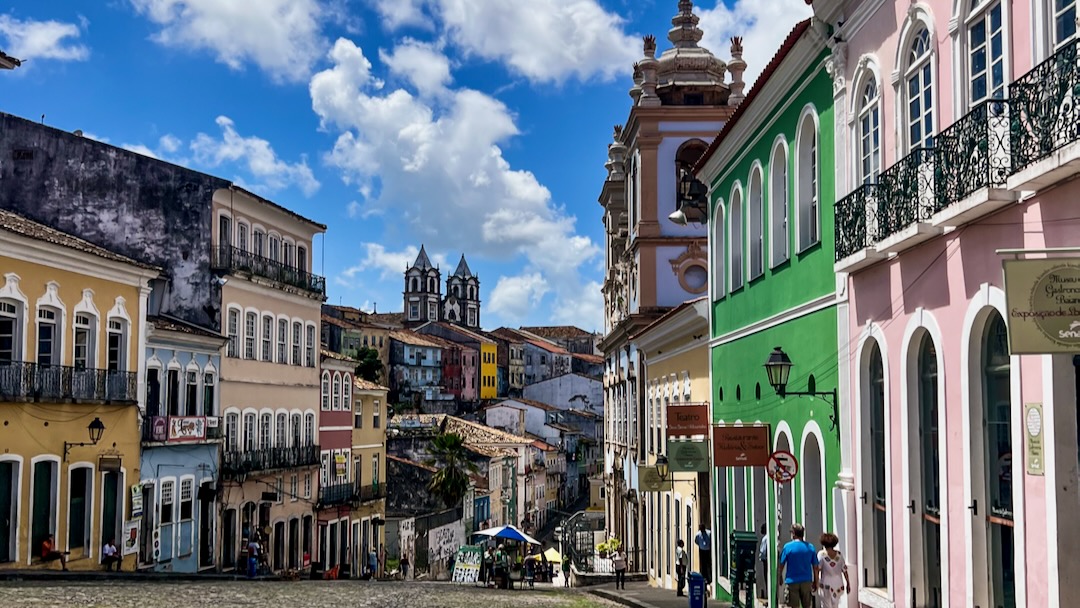




0 Comments